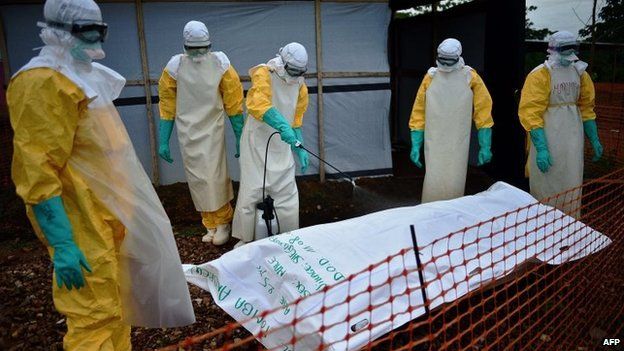Ebola crisis vastly underestimated, says WHO
- Published

The scale of the Ebola outbreak appears to be "vastly underestimated", the UN's health agency says, as the death toll from the disease reaches 1,069.
The World Health Organization said its staff had seen evidence that the numbers of reported cases and deaths do not reflect the scale of the crisis.
It said in a statement that "extraordinary measures" were needed.
The outbreak began in Guinea in February and has since spread to Liberia, Sierra Leone and Nigeria.
The BBC's Lerato Mbele: "With fewer goods coming into the area, prices are beginning to rise"
However, the WHO said the risk of transmission of Ebola during air travel remained low, as the disease is not airborne.
As a consequence, Kenya Airways has rejected pressure to suspend its flights to the Ebola-hit states of West Africa.
Meanwhile, the international ratings agency Moody's says the Ebola outbreak - the world's deadliest so far - may have significant economic ramifications on the affected countries because commercial and transport disruptions are expected to last at least another month.
'Rampant fear'
The WHO said the outbreak was expected to continue "for some time".
"Staff at the outbreak sites see evidence that the numbers of reported cases and deaths vastly underestimate the magnitude of the outbreak," its statement said.
"WHO is co-ordinating a massive scaling up of the international response."
Part of the challenge was the fact that the outbreak was in "settings characterised by extreme poverty, dysfunctional health systems, a severe shortage of doctors and rampant fear", the WHO added.
Ebola virus disease (EVD)
- Symptoms include high fever, bleeding and central nervous system damage
- Fatality rate can reach 90% - but the current outbreak is about 55%
- Incubation period is two to 21 days
- There is no vaccine or cure
- Supportive care such as rehydrating patients who have diarrhoea and vomiting can help recovery
- Fruit bats are considered to be virus' natural host
In Nigeria - where four people have now died of Ebola - the residency training programme for doctors who work in government-run hospitals has been halted amid a nationwide doctors' strike that began in July.
BBC Africa's Chris Ewokor says the termination of the scheme - affecting an estimated 16,000 doctors - is likely to be linked to the ongoing strike as constitutionally other personnel are not allowed to be brought in to do their work.
With fears about the spread of Ebola, the authorities want to be able to bring military doctors into hospitals as part of contingency plans, he says.
The Ebola cases in Nigeria are linked to the late Liberian government employee, Patrick Sawyer, who brought the disease to the city of Lagos in July.
The outbreak is affecting the Youth Olympic Games about to start in China, as the International Olympic Committee (IOC) has ruled that athletes from Ebola-hit countries will not be allowed to compete in combat sports or in the pool, and Sierra Leone and Nigeria have withdrawn from the Games.
Ebola is transmitted by direct contact with the body fluids of a person who is infected.
Initial flu-like symptoms can lead to external haemorrhaging from areas such as eyes and gums, and internal bleeding which can lead to organ failure.
- Outbreak of an undetermined viral haemorrhagic fever begins in Guinea in February
- Identified as Ebola in March
- Researchers have since traced the first case to the death of two-year-old Guinean child in December 2013